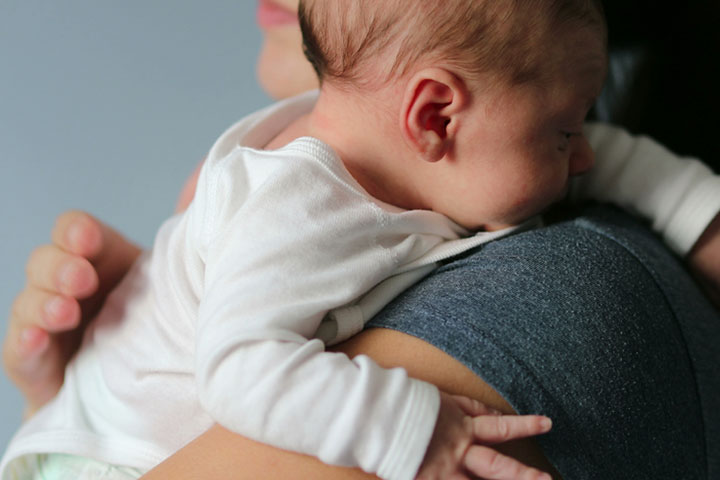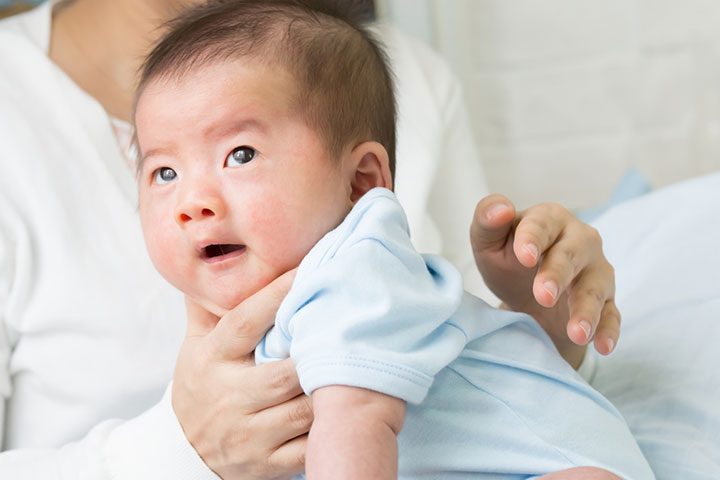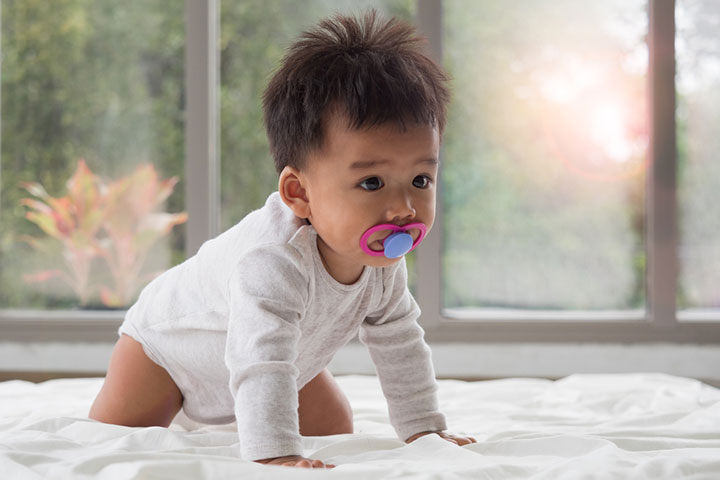You may notice that babies fall asleep very easily after they are breastfed. This is particularly true for newborns. But, if your baby falls asleep while breastfeeding, you may worry that they have not consumed enough milk.
It is normal for babies to doze off while nursing in the warm comfort of your arms, but you may be advised to look for ways to keep your little one awake to ensure a complete feed. This post discusses whether it is safe for babies to sleep while breastfeeding, why that happens, and what can be done to keep them from dozing off.
Why Do Babies Fall Asleep While Breastfeeding?
Babies, especially newborns, fall asleep while breastfeeding due to a full stomach. Studies have shown that an increase in the hormone called cholecystokinin controls the feeling of satiety and induces drowsiness (1) in infants.
The baby may doze off during nursing due to a poor latch. It means that he falls asleep without having sufficient milk. In the long run this could lead to malnourishment. You can prevent this situation by ensuring the baby latches on well. If your baby is making clicking sounds when he is feeding, it means he has a shallow latch which needs correction (2).
A baby’s nervous system stops the sucking reflex after the baby has fallen asleep to prevent gagging and choking. Also, milk flows from the breast only when a baby suckles and not otherwise unless the mother is leaking. This is also known as the milk letdown reflex.
Is It Okay To Nurse A Baby To Sleep?
There is nothing alarming about a baby falling asleep during feeding but sleeping and feeding should be two separate activities. Babies who are nursed to sleep or breastfed before a nap tend to associate feeding with sleeping. In the long term, it becomes a habit and putting the baby to bed becomes difficult once the baby weans.
Long-Term Effects Of Sleeping While Breastfeeding
As a best parenting practice, never feed a baby solely for the purpose of making him fall asleep to avoid long-term repercussions, because:
- The baby will not self-soothe. Learning to self-soothe is important because this keeps the baby stress-free and prevents crankiness.
- It interferes with both feeding and sleeping. If a baby falls asleep while feeding, then it increases the chances of him getting only half the nutrition. Moreover, if the baby is used to taking a feed to sleep, the feeding schedule becomes erratic.
- Affects your sleep. If the baby’s feeding schedule is erratic, it will make your sleep cycle erratic too.
The habit of sleeping during feeding can be broken.
How To Prevent The Baby From Sleeping While Breastfeeding?
Here is how you can stop the baby from sleeping during his feeds:
- Stroke baby’s back or neck: Gently rub or pat the baby’s back and face when he feeds so that his nervous system is busy with a sensation. It will also promote relaxation.
- Keep talking to the infant: Speak to him like you are holding a conversation. Your partner can chip-in and help you with the conversation.
- Feed the baby in a well-lit room: If the room has adequate lighting, then he is less likely to feel drowsy.
- Do not feed the baby in a lying down nursing position. If you and the baby are lying on the bed during the feeding session, then the baby will fall asleep as the position is comforting. Nurse the baby in a slant or near-vertical position.
- Switch breasts and burp the baby: The moment a baby let goes the suction, quickly change the breast. You can also give a break and burp him for a few seconds.
If the baby tends to fall asleep in spite of your efforts, you may use a few tricks to wake him up.
What To Do If The Baby Falls Asleep While Nursing?
Pulling the baby away from the nipple may injure or startle the baby. Hence, if he has fallen asleep while still latched on, you could:
- Rub the baby’s back. Undress the baby and gently rub or tap his upper back. Do not rub the tummy as the baby may throw up.
- Burp the baby. Gently tap the back to burp the baby. This should wake him up, and once he does, you can resume nursing.
- Tickle the feet. Tickle the sole of your baby’s feet or palms.
- Wipe the face with wet, soft cloth. The cooling effect of the water should wake the baby up.
You can also use the above methods to wake the baby before feeding. Alternatively, you could change the nappy or clothes.
Melissa, a mother of two, shares her tactics for keeping her baby awake while nursing. She undresses the baby and changes the diaper to prevent sleepiness. To ensure the baby stays alert, she gently moves the baby up and down. If the baby nods off during feeding, Melissa tickles the baby’s feet until she wakes up. She says,” Tickle baby’s feet. Baby starts eating again. Asleep and pacifying in less than 5 minutes. Tickle feet again. And again. And again. Eventually, the baby will become immune to this. Move on to rubbing her back. Again. And Again. And again until the baby is immune to this as well. Rub her hands. Again. And again. And again, until immune to that as well (i).”
Experts recommend parents to keep the baby completely awake before breastfeeding, right from the first month (3).
Unlatching the sleeping baby from the breast after he is fed:
Unlatch the baby after nursing so that he does not begin to associate sleep with nursing. Here is a way to unhook the baby once he has fallen asleep:
- Gently place your clean index finger on the side of the baby’s mouth and between the gums.
- Turn your finger in either direction till you feel the suction loosening.
- Gently pull the baby while you do so.
Once you have successfully unlatched the baby, you could put him in the crib or bed.
How To Break The Habit Of Sleeping While Breastfeeding?
As mentioned, if your little one dozes off every time he feeds, then he may have got used to it. However, it is not difficult to break the habit, and here are ways to bring in the change:
1. Have separate feeding and sleeping routines:
Babies learn to associate events with an activity when they occur consistently. Establish a bedtime routine by following a particular sequence of activities such as bathing and reading a storybook before going to bed. The infant will not understand the sequence immediately but soon comprehends that bathing and listening to a book mean that it is time to sleep. If it is time for a feeding session and he is asleep or if he has fallen asleep while feeding, then wake him up.
2. Use a pacifier:
Pacifiers help calm and soothe the baby, sometimes even to sleep. In fact, they act as a sleep aid and are often recommended by experts for babies who depend on feeds to fall asleep. The American Academy of Pediatrics suggests using a pacifier as a replacement for a bottle or breast nipple (4). However, do not introduce the pacifier until the baby has an established breastfeeding routine (5). Never give a pacifier to a baby younger than a month (6). Infants may suck their thumb to soothe themselves to sleep, especially when you withdraw breastfeeding for sleeping.
3. Use other ways to soothe the baby to sleep:
Use a bit of cajoling and soothing such as speaking in a soft voice, singing a song, or playing with his favorite toy to put him to bed. At night, place the baby’s crib right next to yours so you are in his line of sight. The assuring presence of a parent is sometimes all the infant needs to fall asleep peacefully. It also promotes their bonding with you.
It is common to see that a baby falls asleep while breastfeeding because of satiety. However, sometimes the baby may sleep because of poor latching, leading to inadequate feeding. While there is no harm, babies might start sensing an association of sleep with feeding, interfering with the mother’s sleep. So, to prevent babies from sleeping while breastfeeding, you may stroke the baby’s neck, feed in a lighted room, or burp the baby in between feeds. Even if the baby falls asleep, you may gently tickle their feet or wipe their face with a cloth. It is important to break the habit of sleeping so babies can feed adequately and not develop malnourishment.
You may be concerned if your baby continuously falls asleep while nursing. Check out this informative video to get a clear understanding of why this is happening and how you can help your baby.
Key Pointers
- It is normal for babies to fall asleep while breastfeeding.
- Falling asleep may be caused by a full stomach or poor latch, and these issues should be addressed to prevent malnutrition.
- Falling asleep while nursing can have long-term effects, such as interfering with sleep and feeding patterns and preventing the child from learning to self-soothe.
- To prevent the child from falling asleep while nursing, stroke their back and neck, talk continuously, burp the baby, and feed in a well-lit room.
- To break the habit of falling asleep while nursing, use a pacifier and establish separate feeding and sleep routines.















